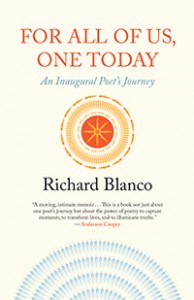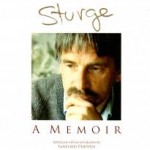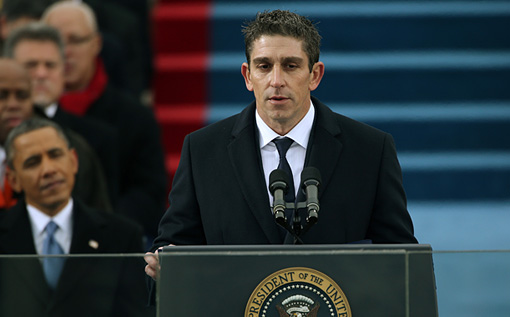 For All of Us, One Today: An Inaugural Poet’s Journey
For All of Us, One Today: An Inaugural Poet’s Journey
by Richard Blanco
Beacon Press. 112 pages, $15.
 Sturge: A Memoir
Sturge: A Memoir
Edited by Sanford Phippen
Downeast Graphics. 304 pages, $30.
MAINE IS the home of choice of young poet Richard Blanco and was the family home of recently deceased gay rights pioneer Sturgis Haskins. Blanco and his partner, Mark, a research scientist, live in the upscale ski resort town of Bethel, in the western part of the state; Haskins, who died in 2012, lived in New York and Boston in his earlier years, but always came back to his hometown of Sorrento, in coastal Maine.
Born in Spain in 1969 of Cuban parents who’d fled the island, Blanco was all of six weeks old when he arrived in the U.S. In his self-described “memoirette” For All of Us, One Today, he briefly outlines his life. Growing up in New York and Miami, he was called “fatso” and “faggot” by the other children and immersed himself in reruns of an idealized America via The Brady Bunch, Leave It to Beaver, and My Three Sons. Both creative and good at math, he received a degree in civil engineering, where one of his duties was writing reports. He became very cognizant of “the way language worked,” discovering that “language had to be engineered [his italics]in a way, just like the bridges and roads I was designing.”

How he came to be chosen by the Presidential Inaugural Committee remains a mystery despite this memoir, but he was in fact the fifth inaugural poet, the first to be openly gay, the first Hispanic, and the first immigrant. On being selected, Blanco was instructed to write three poems in three weeks so that the committee would have a choice. He describes the gamut of emotions he experienced, from utter joy at getting the news, to cautious confidence, to anxiety, and finally to the realization that he needed to explore the “American side of the hyphen as much as my Cuban side.” He made a deliberate decision to “leave politics to the politicians.”
Blanco shares the history of each of the three poems, “What We Know of Country,” “Mother Country,” and the chosen inaugural poem, “One Today.” Of the last poem he writes: “One of the great challenges of writing an occasional poem is how to be intimate and conversational while also being grand and Whitmanesque.” He memorized “One Today” so he wouldn’t have to worry about stumbling over the words on a page, and even up to the last moment was making minor revisions. Over the past two years, Blanco has given readings across the country and set up a two-week visiting writers’ fellowship in Bethel.
Sturgis (“Sturge”) Haskins was a man of an earlier generation, with deep Maine roots. He survived by giving sailing lessons and selling boats, but his real work, in the words of Sanford Phippen, editor of Sturge: A Memoir, was “Being Sturge.” Haskins, rather like Andy Warhol, saved everything that came his way, keeping dozens of scrapbooks that are now scattered among various academic repositories. Phippen, a well-known Maine writer and editor, had access not only to the scrapbooks but also to journals, letters, published and unpublished articles on a myriad of topics, and eloquent postings on the Maine GayNet listserv. This rich trove of material, threaded with Phippen’s own recollections, makes for a loving recollection of his lifelong friend.
The book is divided into chapters covering many aspects of Haskins’ life, from sex to rug-hooking, croquet to hiking. Born in 1940, young Sturgis realized that he was “different” when he was a young teen and saw the word “homosexual” on a Hollywood pulp magazine on a local newsstand. He “grew dizzy and nearly fainted. I knew unmistakably, that I was one of THEM.” However, he remained closeted for many years, unable to come out to his family.
After a couple of years at the University of Maine-Orono (UMO), he dropped out and went to New York to “meet another gay person.” In New York his life was a whirl of museum-going, readings, occasional college classes, and sex. “I was so obsessed with sex,” he recalled, that for a time he lived at the YMCA. When he returned to Maine, he helped found a gay group in Bangor in the early 1970s. He also lived in Boston for a time, where he wrote for Gay Community News (GCN) and, in 1977, founded the Chiltern Mountain Club because he wanted to find some new hiking friends.
During one of his moves back to Maine, Haskins became one of the founders, in 1973, of the still active Wilde–Stein Club at UMO. It was named, of course, for Oscar and Gertrude (with a bow to UMO’s classic school song, the “Maine Stein Song,” which became a 1930s hit tune after it was recorded by Rudy Vallee). It remains open to question whether or not he was enrolled as a UMO student. In April 1974, he helped organize the first Maine Gay Symposium. This made national news, often described by newspaper reporters with the requisite slurs of the time. (In the fall of 1974, I spent a semester at UMO and remember having seen the Wilde–Stein table during orientation, though I didn’t have the nerve to get up close.)
Though the victim of more than his fair share of homophobia, this “proud gay man from Downeast Maine” (as Phippen calls him) was fortunate to have throngs of loving friends and several gay relatives. This collection does ample justice to his legacy.
Martha E. Stone, a research librarian and lecturer based in Boston, is the literary editor of this magazine.





